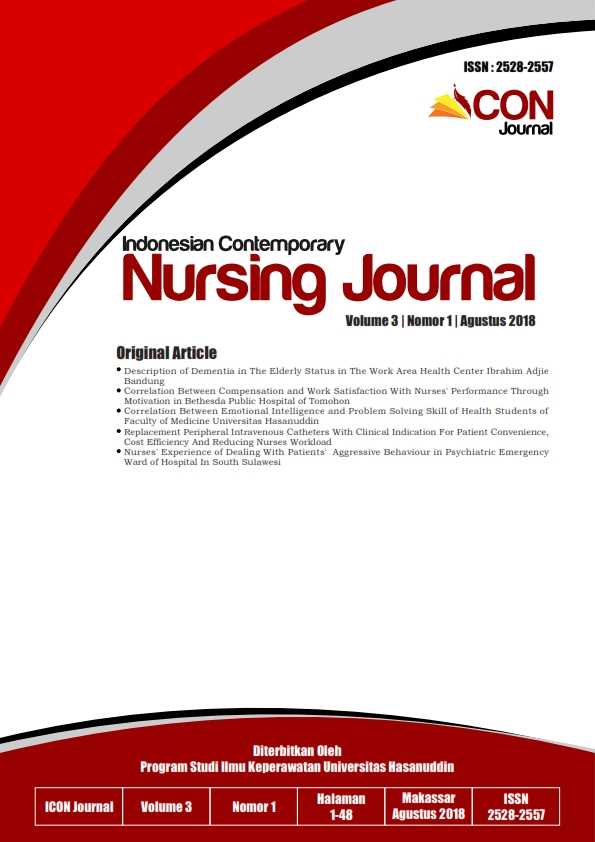Nurses’ Experience of Dealing With Patients’ Aggressive Behaviour in Psychiatric Emergency Ward of Hospital in South Sulawesi
DOI:
https://doi.org/10.20956/icon.v3i1.3982Abstract
Introduction: The high level of risk emergency psychiatry nurse becomes the target of aggressive behavior in patients both physically and psychologically, providing a special experience for nurses. Positive and negative impacts felt more likely a psychological effect on the nurse. Objective: Identifying the experiences of nurses dealing with patient of aggressive behavior in Emergency Psychiatric of Rumah Sakit Khusus Daerah Provinsi Sulawesi Selatan. Methods: The phenomenological approach to decision informants using purposive sampling with the informant as much as 9 informants who have experienced aggressive behavior from patients. Results: There were 7 themes obtained by the feelings of nurses with aggressive behavior patients, nurses experienced different kinds of aggressive behavior, nurses identified about the causes of the patient's aggressive behavior, nurse found some signs of the patient while being aggressive, nurses perceived impact of agresive behavior after getting the incident of it, the way nurses treated patients aggressive behavior, and nurses found obstacle to overcome aggressive behavior's patient. The positive experience of nurses in dealing with patient of aggressive behavior was nurse know the proper ways, causes and signs of the patient while being aggressive so the nurse was able to anticipate the action will be carried out. On the other hand the negative experience felt by the nurse due to the impacts of the aggressive behavior patients. Conclusions and: The experience felt by nurses in dealing with patients in Psychiatric Emergency Unit of Rumah Sakit Khusus Daerah Provinsi Sulawesi Selatan there were positive and negative. Therefore, we need a way to reduce aggressive behavior and provide management training for nurses in dealing with aggressive behavior in order to keep patients safely.
References
DAFTAR PUSTAKA
Anderson, A., & West, S. G. (2011). Violence Against Mental Health Professionalls: When the Treater Becoms the Victim. Innovation in Clinical Neurooscience, Vol.8 (3) , 34-39.
Arnetz, J. E., & Arnetz, B. B. (2001). Violence towards health care staff and possible effects on the quality of patient care. Social Science and Medicine, 52 , 417-427.
Baby, M., Glue, P., & Carlyle, D. (2014). Violence is Not Part of Our Job: A Thematic Analysis of Phychiatric Mental Health Nurses' Experiences of Patiet Assaults from a New Zealand Perspective. Issues in Mental Health Nursing, Vol.35 , 647-655.
Elita, V., Setiawan, A., Wahyuni, S., & Woferst, R. (2011). Persepsi Perawat Tentang Perilaku Kekerasan yang Dilakukan Pasien Di Ruang Rawat Inap Jiwa. Jurnal Ners Indonesia Vol.1, No.2 , 31-40.
Evan, D., Wood, J., & Lambert, L. (2002). A review of physical restraint minimization in the acute and residential care satting. Journal of Advance Nursing, 40(6) , 616-625.
Foster, C., Bowers, L., & Nijman, H. (2007). Aggressive Behaviour on Acute Psychiatric Wards: Prevalence, Severity, and Management. Jurnal of Advanced Nursing , 140-149.
Gabbey, A. E. (2016, Maret 7). Aggressive behavior. Retrieved September 28, 2016, from healthline: http://www.healthline.com/health/aggressive-behavior
Jusmiati. (2016, Agustus 25). Pengalaman menghadapi pasien dengan perilaku agresif di rumah sakit jiwa. (Hasnah, Interviewer)
Kementerian Kesehatan Republik Indonesia. (2009, Oktober 13). Kesehatan Jiwa sebagai Prioritas Global. Retrieved September 5, 2016, from Kementerian Kesehatan Republik Indonesia: http://www.depkes.go.id/article/view/394/kesehatan-jiwa-sebagai-prioritas-global.html
Kindy, D., Petersen, S., & Parkhurst, D. (2006). Perilous work: nurses' experinces in psychiatric nits with high risk of assault. Archives of Psychiatric Nursing, Vol.19, No.4 , 169-175.
Lisa, M., Jumaini, & Indriati, G. (2013). Pengalaman perawat dalam merawat pasien dengan risiko perilaku kekerasan (RPK). 1-12.
National Alliance on Mental Illness. (n.d). Mental Health Conditions. Retrieved Oktober 17, 2016, from NAMI: National Alliance on Mental Illness: https://www.nami.org/Learn-More/Mental-Health-Conditions
Nontji, W. (2014). Kompetensi Diploma 3 Keperawatan. Retrieved November 17, 2016, from Perpustakaan Stik Avicenna: http://perpustakaan.stik-avicenna.ac.id/wp-content/uploads/2014/11/Download-KOMPETENSI-DIPLOMA-3-KEPERAWATAN.pptx.
Saryono, & Anggraeni, M. D. (2013). Metodologi Penelitian Kualitatif dan Kuanttitatif dalam Bidang Kesehatan. Yogyakarta: Nuha Medika.
Stuart, G. W. (2013). Principles and Practice of Psychiatric Nursing Tenth Edition. St Loius Missouri: Mosby, an imprint of Elsevier Inc.
Swan, J., & Mitus, M. C. (2014). Workplace violence. Retrieved Agustus 24, 2016, from Wild Iris Medical Education, Inc.: http://nursingceu.com/courses/455/index_nceu.html
Townsend, M. C. (2012). Psychiatric Mental Health Nursing: Concepts of Care in Evidence-Based Practice Seventh Edition. Philadelphia: F.A. Davis Company.
Downloads
Published
How to Cite
Issue
Section
License
Authors who publish with this journal agree to the following terms:Authors retain copyright and grant the journal right of first publication with the work simultaneously licensed under a Creative Commons Attribution License that allows others to share the work with an acknowledgement of the work's authorship and initial publication in this journal.
Authors are able to enter into separate, additional contractual arrangements for the non-exclusive distribution of the journal's published version of the work (e.g., post it to an institutional repository or publish it in a book), with an acknowledgement of its initial publication in this journal.
Authors are permitted and encouraged to post their work online (e.g., in institutional repositories or on their website) prior to and during the submission process, as it can lead to productive exchanges, as well as earlier and greater citation of published work (See The Effect of Open Access).



